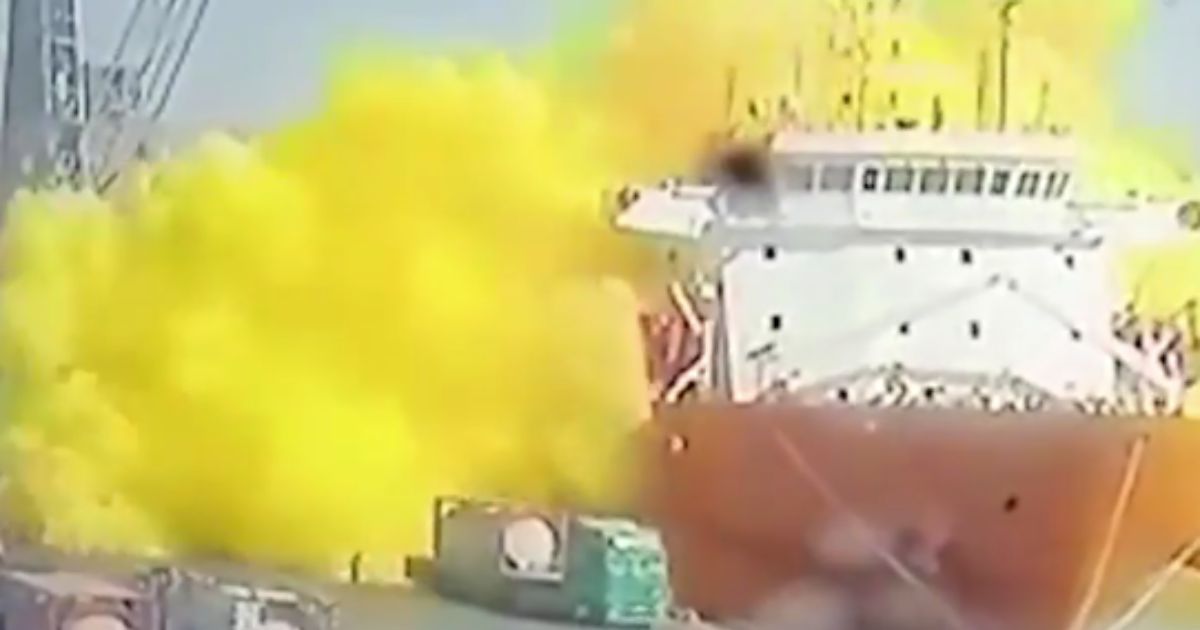A crane in Jordan’s port of Aqaba dropped a container carrying 25 tons of toxic chlorine gas Monday, killing and wounding hundreds of people.
The leak that ensued killed 13 and injured 251, Jordanian government spokesman Faisal al-Shaboul told Qatar-based Al Jazeera.
The gas was part of a shipment of chlorine gas to Djibouti.
CCTV cameras captured the moment the storage tank slipped from a hoist while being lowered onto a ship’s deck at the port. State-run Jordan TV shared footage of the incident
#عاجل | فيديو حادث تسرب غاز من صهريج في العقبة#الأردن #العقبة #التلفزيون_الأردني pic.twitter.com/MZqeoUvxtG
— Jordan TV-التلفزيون الأردني (@JrtvMedia) June 27, 2022
The tank exploded after falling, and the escaping gas covered nearby areas in toxic greenish-yellow gas clouds, footage showed.
One truck that was reversing toward the ship wisely changed direction and sped away as soon as the accident occurred. The video showed workers desperately fleeing the site in all directions on foot.
Authorities soon responded to the incident by ordering an evacuation and hospitalizing the wounded.
Local health official Dr. Jamal Obeidat sent out messages, urging people nearby to close their windows and stay indoors, Al Jazeera reported.
“We asked the ships that were near the area of the tank explosion to stay away from the area immediately,” Director-General Muhammad Salman of Jordan’s Maritime Commission said via the state-run Petra news agency, The Sun reported.
Salman said that grain silos nearby were checked for toxicity following the incident.
On Tuesday, Minister for Environment Muawiya Radaydah said that the air and water in Aqaba were free of chlorine contamination, according to the Petra news agency.
Authorities made the determination after testing seawater samples, grain silos and air in various parts of the port city, Radaydah said.
The injured included 28 public security, civil defense, and law enforcement personnel, the Public Security Directorate said Tuesday, according to Petra.
According to the Environmental Protection Agency, chlorine gas has multiple industrial applications. The gas can be used as a disinfectant to purify water for drinking, swimming pools, and ornamental ponds. Chlorine is also used to treat sewage water.
“Chlorine gas also is used as a disinfectant, microbistat/microbicide and algicide in food processing systems, pulp and paper mill systems, and commercial and industrial water cooling systems,” the EPA said in a fact sheet on the substance. “It is used in washing meat, fresh produce, and seeds to control decay-causing microorganisms.”
However, the gas can also be used as a weapon of war or in a terrorist attack. Chlorine was first used for military purposes in World War I by German troops, who deployed it in 1918 against two French colonial divisions at Ypres, Belgium.
The gas was also used by Russian-backed Syrian dictator Bashar al-Assad in the past decade. Al-Assad deployed chlorine bombs against civilians and anti-regime rebels, alongside those comprised of sarin nerve gas and sulfur.
Exposure to Chlorine can cause death or injuries due to internal burning. According to the EPA, chlorine exposure can induce bronchitis, asthma, lung swelling, headaches, heart disease and meningitis.
Not all effects of chlorine exposure, however, are permanent, the EPA said.
It was unreported for what purposes was the chlorine gas being exported to Djibouti.
This article appeared originally on The Western Journal.

























 Continue with Google
Continue with Google